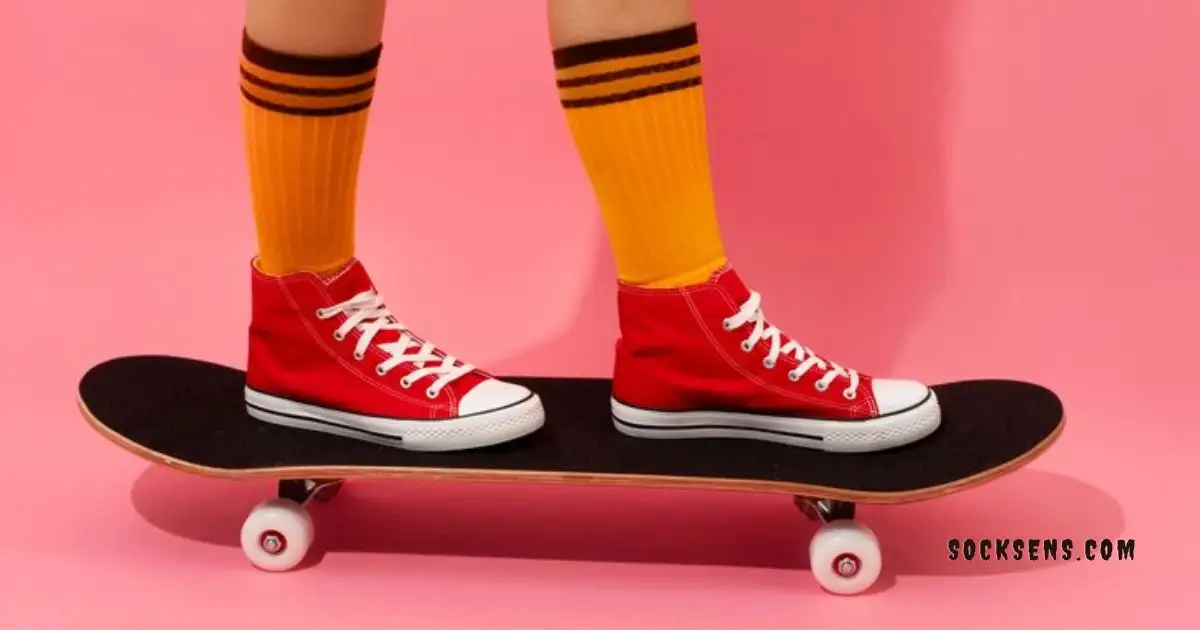Do you need grip socks for Pilates? While Quora hosts 563 answers to this question. While it’s not mandatory to wear grip socks during Pilates, they can significantly enhance your practice. Grip socks provide added stability and prevent slipping, especially during footwork on the reformer, where there’s considerable pressure involved.

As someone who contracted athlete’s feet due to establishments not requiring socks, I implore you all to either bring your own loops or wear grip socks.
And yes, I am placing blame on a public space not cleaning their equipment since I had never had it prior. And I will never not wear something on my feet in any public area.
The debate centers on safety, hygiene, and personal comfort. Some practitioners, like myself, prefer teaching barefoot to allow feet to breathe.
However, studio policies often require grip socks to maintain cleanliness and prevent slips.
For instance, in our studio, clients must wear grip socks, gloves, and face masks to participate in classes.
Ultimately, the choice depends on individual preferences and specific studio guidelines.
In this comprehensive guide, we’ll explore whether you need grip socks for Pilates, their benefits, their role in hygiene, and how they align with personal preferences.
Table of Contents
For further insights, visit these sources


Understanding Grip Socks
What Are Grip Socks?
Grip socks are specialized footwear designed for fitness activities, featuring non-slip soles to enhance stability and prevent slipping.
Typically made from breathable materials like cotton or a cotton blend, these socks offer a snug fit and are often equipped with textured grips on the soles.
This design ensures a secure footing during exercises, especially on equipment like the Pilates reformer.
Benefits of Wearing Grip Socks in Pilates
Enhanced Stability and Balance
In my Pilates sessions, I’ve noticed that wearing grip socks significantly improves my stability.
The textured soles provide a firm grip on the reformer, allowing me to maintain proper alignment and execute movements with greater control.
This added stability is particularly beneficial during dynamic exercises that require precise foot placement.
Improved Hygiene and Protection
Having experienced plantar warts from a locker room floor as a child athlete, I understand the importance of hygiene in fitness settings.
Grip socks act as a protective barrier between my feet and shared equipment, reducing the risk of infections and maintaining a cleaner environment for everyone.
This practice aligns with studio policies that prioritize cleanliness and safety.
Increased Comfort During Exercises
While I initially preferred teaching barefoot to allow my feet to breathe, I’ve found that wearing grip socks with added arch support and padding enhances my comfort during classes.
The extra cushioning reduces foot fatigue, allowing me to focus more on the exercises and less on discomfort.
Additionally, the mantras on my socks, like “Be Grateful” and “Be Fearless,” serve as positive reminders throughout my practice.
As a Pilates instructor, I initially preferred teaching barefoot to allow my feet to breathe.
However, studio policies now require wearing grip socks to maintain hygiene and prevent slips.
I now choose socks with mantras like “Be Grateful” or “Be Fearless,” which add comfort and positivity to my practice.
The Case for Wearing Grip Socks
Safety Considerations
Grip socks enhance stability, reducing the risk of slips and falls, particularly on equipment like Reformers.
They provide additional support and cushioning, minimizing the impact on your feet and joints during dynamic movements.
Hygiene Factors
Wearing grip socks acts as a barrier between your feet and shared equipment, helping to minimize the spread of germs and foot-related issues.
They also keep your feet dry and comfortable, promoting a more hygienic environment.
Studio Policies and Etiquette
Many studios require grip socks to maintain cleanliness and safety. For instance, Club Pilates mandates grip socks to prevent injury and ensure stability on the Reformer.
The Case Against Wearing Grip Socks
Barefoot Benefits
While I now wear grip socks, I still miss the natural feel of my feet on the mat.
Barefoot Pilates enhances proprioception and provides better tactile feedback, which is crucial for balance and movement.
For some, this is a key reason to avoid grip socks.
Personal Preferences and Comfort
Comfort is subjective. Some clients feel restricted in grip socks, while others appreciate the extra support.
For me, it’s about finding the right balance.
My sticky socks have extra arch support and padded soles, making them comfy and functional.
Expert Opinions and Community Insights

Instructor Perspectives
As an instructor myself, I understand the importance of using grip socks in a Pilates studio.
While I prefer teaching barefoot to allow my feet to breathe, I now wear sticky socks because they help maintain hygiene and prevent slipping, especially during footwork on the reformer.
They also provide extra comfort with added arch support and padding.
Community Experiences
From Reddit and Quora, I gathered that while many Pilates enthusiasts value grip socks for their stability and hygiene benefits, others argue that barefoot practice is superior to proprioception.
Some Pilates studios require them for safety, cleanliness, and to maintain equipment hygiene.
For more insights, feel free to check out discussions on Reddit and Quora.
Choosing the Right Grip Socks
Key Features to Look For
When selecting grip socks for Pilates, comfort and functionality are essential.
After experimenting with different brands, I can confidently say that non-slip grip patterns are a must-have.
These patterns prevent slipping during movements, enhancing stability.
Additionally, breathable materials like cotton or moisture-wicking fabrics keep your feet dry, crucial for long sessions.
Fit is also paramount. Ensure the socks aren’t too tight or loose to avoid discomfort or restricted movement.
Top-Rated Grip Socks for Pilates
Here are a few Best pilates socks I recommend based on personal experience:
- Core Chaud Merino Grip Socks: I love how these socks combine comfort with a unique steam pattern on the soles, which adds both style and function. They provide excellent grip without compromising on flexibility.
- ToeSox Grip Socks: These are perfect for those who prefer individual toe spaces. The non-slip soles are reliable, and the breathable fabric keeps my feet cool throughout Pilates.
- Gaiam Essentials: Known for their affordability and quality, these grip socks are a great entry-level option without sacrificing performance.
Choosing the right pair can significantly impact your Pilates practice.
As someone who values both style and comfort, these options have made a noticeable difference in my sessions.
Making an Informed Decision
Assessing Your Needs
When deciding if grip socks are right for you, it’s important to consider the type of Pilates you practice.
For example, Reformer Pilates requires more stability and traction, making grip socks essential.
On the other hand, mat Pilates may allow for more flexibility and barefoot movement.
Consulting with Your Studio
Many Pilates studios now require grip socks for hygiene and safety reasons.
Always check with your studio for their policies and recommendations.
Some studios may even sell or provide grip socks for clients.
Comfort & Hygiene Concerns
Grip socks provide a barrier between your feet and the mat, which can be a cleaner option, especially in shared studio spaces.
For personal comfort, look for socks with additional arch support or padding.
FAQs – Do you Need Grip Socks for Pilates?
How do grip socks help in walking?
Grip socks enhance stability during walking by providing better traction, reducing the risk of slipping.
Can I keep socks on in a yoga class?
Yes, you can wear socks during a yoga class. However, regular socks may cause slipping; it’s advisable to use grip socks designed for yoga to maintain stability.
Do I Need to Buy Special Grip Socks, or Can I Just Wear an Old Pair of Socks?
While regular socks can be worn, grip socks are specifically designed with non-slip soles to provide better traction during Pilates exercises, enhancing safety and performance.
Do People Need Grip Socks For Reformer Pilates?
Yes, grip socks are recommended for Reformer Pilates. They provide traction and help prevent slipping when using the carriage or other smooth parts of the reformer.
Pilates Footwear Recommendations
For Pilates, it’s best to wear grip socks that offer non-slip soles for stability. Some practitioners also prefer minimal footwear or going barefoot, depending on the studio’s policy and personal comfort.
Conclusion – Do you Need Grip Socks for Pilates?
For a visual explanation of this topic, you might find the following video helpful:
To summarize, grip socks for Pilates are considered beneficial for providing stability and preventing slipping during exercises.
Many studios require them to maintain cleanliness and hygiene, particularly in situations where participants share equipment.
However, whether you need them depends on factors like comfort, studio policies, and the type of Pilates you practice.
Some people, like me, enjoy wearing comfortable socks with supportive features, while others may prefer going barefoot.
Ultimately, your choice should align with your studio’s rules and your personal preferences for safety and hygiene.
More Info… Do you need grip socks for Pilates?
How to DIY Pilates Grip Socks Tropeaka Life Hacks
La Active Grip Socks – 2 Paris Yoga Pilates Baree Our Point Of View


